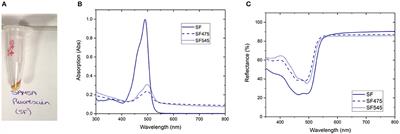EDITORIAL
Published on 23 Mar 2021
Editorial: Women in Lanthanide-Based Luminescence Research: From Basic Research to Applications
doi 10.3389/fchem.2021.667672
- 1,532 views
- 2 citations
12k
Total downloads
46k
Total views and downloads
EDITORIAL
Published on 23 Mar 2021
MINI REVIEW
Published on 25 Jan 2021

ORIGINAL RESEARCH
Published on 08 Jan 2021

ORIGINAL RESEARCH
Published on 21 Dec 2020

MINI REVIEW
Published on 14 Dec 2020

REVIEW
Published on 08 Dec 2020

MINI REVIEW
Published on 09 Nov 2020

REVIEW
Published on 06 Nov 2020

ORIGINAL RESEARCH
Published on 04 Nov 2020

ORIGINAL RESEARCH
Published on 16 Sep 2020

ORIGINAL RESEARCH
Published on 07 Aug 2020
